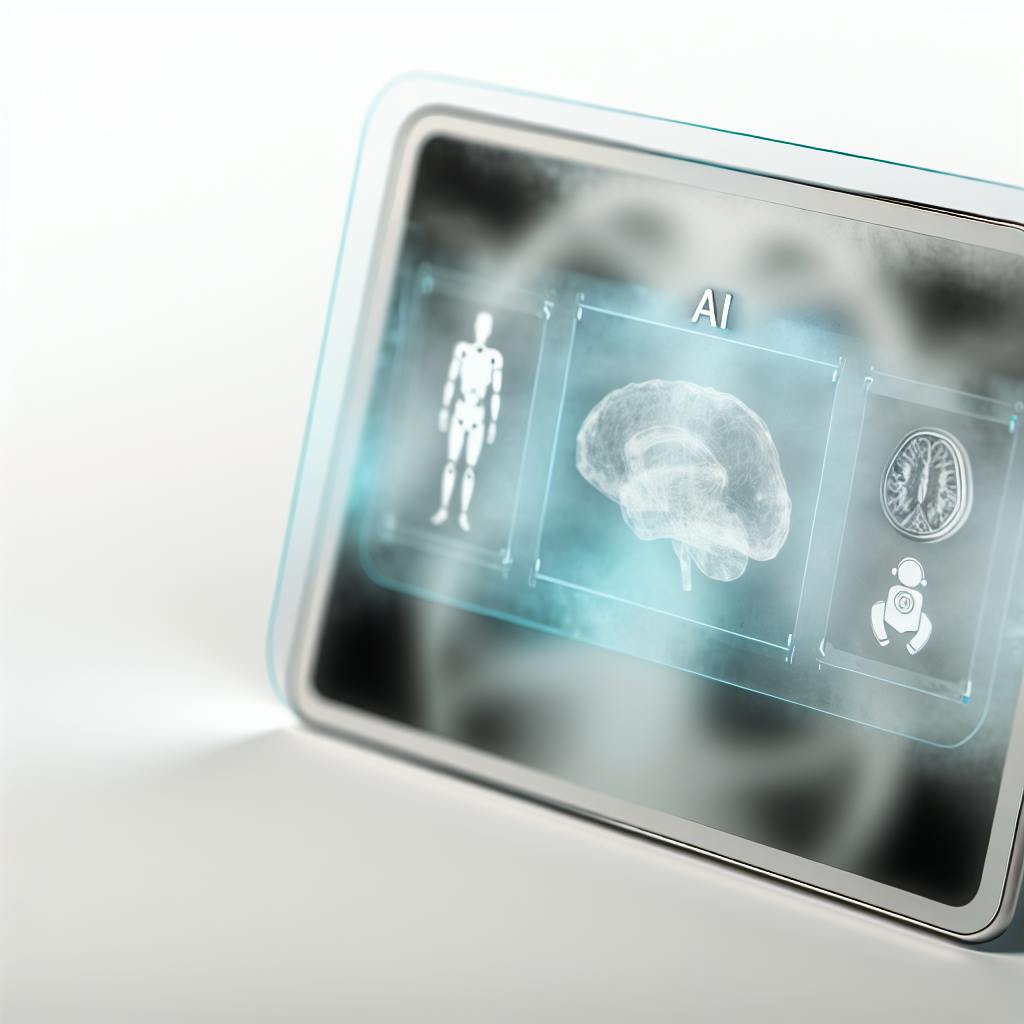Looking for the best AI medical scribes for 2024? We've got you covered with a detailed guide to help you choose the right one for your healthcare team. These AI scribes are revolutionizing how patient interactions are documented, integrating seamlessly with EHR systems, and ensuring high levels of accuracy and security. From solopreneurs to large healthcare systems, there's an AI scribe out there to meet your needs. Here's a quick rundown:
- DeepCura: High accuracy, strong EHR integration, customizable, user-friendly, strong compliance, and 24/7 support.
- Freed: Excellent accuracy, seamless EHR compatibility, customizable, straightforward UI, and robust security.
- DeepScribe: Superior accuracy, fits well with major EHR systems, customizable, easy to use, and highly secure.
- Nuance: Accurate documentation, direct EHR sync, personalization options, simple interface, and top-notch security.
- ScribePT: Great at capturing consultations, easy EHR addition, customizable, and simple navigation.
- Suki: Understands medical context well, automates EHR entries, customizable, hands-free operation, and secure.
- Augmedix: Reliable note-taking, easy EHR connection, customizable, mobile-friendly, and secure.
- Tali AI: High accuracy, smooth EHR integration, highly customizable, voice-activated notes, and secure.
- ScribeLink: Real-time documentation, writes directly into EHRs, adjustable to doctor needs, and prioritizes security.
- Mutuo Health Solutions: Understands medical discussions, bi-directional EHR communication, highly customizable, and secure.
Choosing the right AI medical scribe depends on your specific needs, budget, and practice setting. It's crucial to consider the integration complexity, training requirements, and privacy concerns. By focusing on these factors, you can significantly improve documentation efficiency and patient care quality.
Accuracy
- It's super important that the AI can listen and write down what's said correctly, even when people talk over each other or have different accents. We're aiming for almost no mistakes.
- The AI should get smarter and make fewer mistakes over time as it learns.
EHR Integration
- The best AI scribes can easily work with the big electronic health record systems like Epic and Cerner.
- They should be able to send information straight to these systems without anyone having to fix it up first.
- They can share data right away with the health record system using special tech tools.
Customization
- Doctors work in different areas, so being able to change templates to fit what they need is great.
- Being able to tweak things, like adding shortcuts, makes the tool more helpful.
- You can even make it look more "you" by changing colors and adding your logo.
User Interface
- The tool should be easy to use so doctors don't have to spend a lot of time learning it.
- It should have a simple screen that shows everything you need in one spot.
- Being able to use it on any device means you can work from anywhere.
Compliance & Security
- The tool must follow strict rules to keep patient info safe, using things like encryption.
- It should have a backup in case anything goes wrong to avoid losing any information.
- It must meet all the legal requirements for keeping health information secure and private.
Support
- Good support means you can get help through a call, email, or chat.
- They should offer guides and training to help you get the most out of the tool.
- A place where users can share tips with each other is really useful.
Picking an AI medical scribe by looking at these areas makes sure you get one that's safe, fits into your work easily, can be made to suit your needs, and comes with good help and support.
Top AI Medical Scribes of 2024
1. DeepCura

Accuracy and Reliability
DeepCura is really smart at writing down what doctors and patients say during visits. It uses some of the latest tech to make sure it gets the conversation right more than 98% of the time. It also gets better as it goes, learning from its mistakes to improve.
EHR Integration
DeepCura works well with the computer systems doctors use to keep track of patient info, like Epic and Cerner. It can automatically put the right info into these systems, so doctors don't have to type it in themselves. It can talk both ways with these systems, making things smoother.
Customization Options
Doctors can change how DeepCura works to fit what they need. They can make their own templates, use shortcuts, and even change how it looks. There's a library of ready-to-use templates that make things quicker, too.
User Interface and Ease of Use
DeepCura is easy to use, with a clear dashboard that shows everything in one place. You can use it on any device, which is great for doctors on the move. It's designed to be user-friendly, even for people who aren't tech-savvy.
Compliance and Security
DeepCura follows strict rules to keep patient info safe, using strong encryption and other security measures. It's checked regularly by outside experts to make sure it's really secure.
Customer Support
DeepCura has a 24/7 help team ready to answer questions through chat, email, or phone. They also have online guides and a community forum where users can share tips. They're quick to respond when you need help.
2. Freed
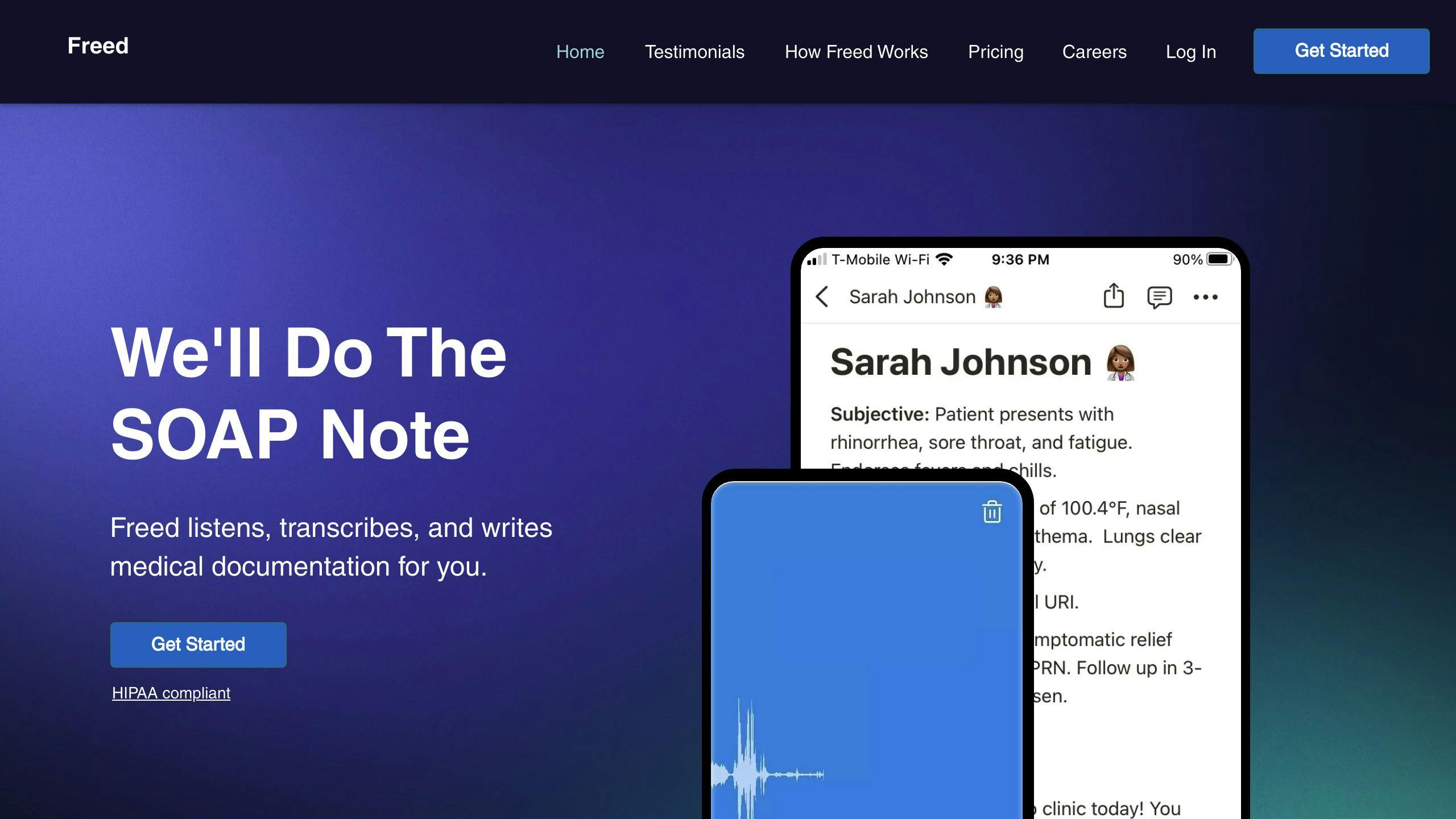
Accuracy and Reliability
Freed uses smart tech to listen and write down what happens in doctor-patient talks really well, hitting more than 98% accuracy. It gets better as it learns from any fixes doctors make or by picking up on how different doctors talk.
EHR Integration
Freed connects smoothly with big health record systems like Epic and Cerner. This means doctors don't have to waste time copying notes over; Freed does it for them.
Customization Options
Doctors can make Freed work just how they want, changing templates or creating shortcuts for things they do a lot. They can also change how it looks, like fonts and colors, and even add their own logo.
User Interface and Ease of Use
Freed's main screen is simple to use, putting everything important in one spot. It works on all devices, so doctors can use it wherever they are. It's made to be easy for anyone to use, even if you're not great with tech.
Compliance and Security
Freed makes sure patient info is kept safe, following strict privacy rules and using things like encryption to protect data. It's regularly checked by outside groups to make sure it's really secure.
Customer Support
Freed offers help any time through phone, email, or chat. They also have online guides and a forum where users can share advice and tips.
3. DeepScribe
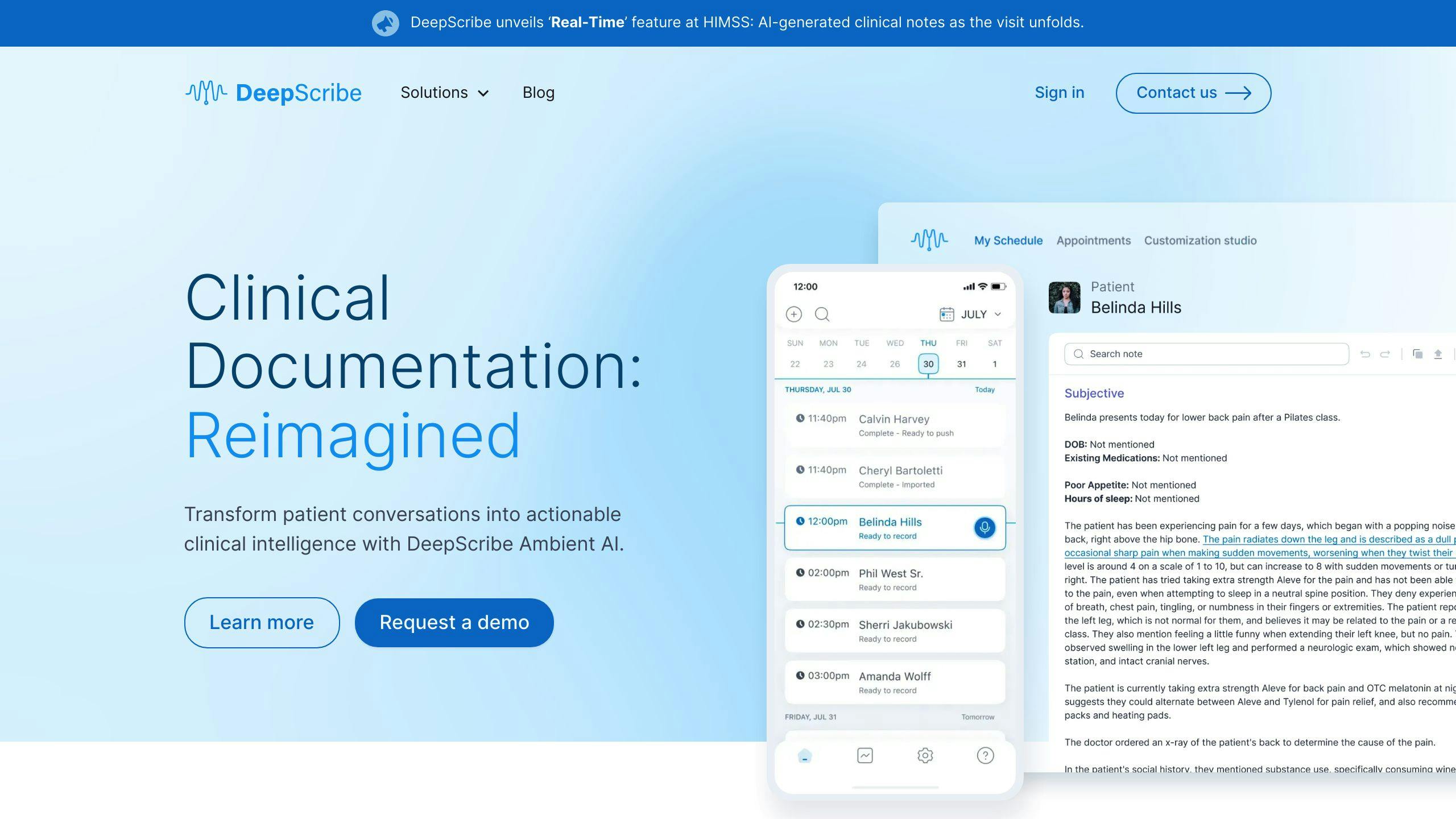
Accuracy and Reliability
DeepScribe is really good at listening and writing down what doctors and patients say to each other. It gets things right more than 98% of the time because it uses smart tech to understand speech. Plus, it learns from any corrections to get even better.
EHR Integration
DeepScribe fits right into the systems hospitals use to keep patient records, like Epic and Cerner. This means doctors can easily check and finish up their notes without having to jump through hoops.
Customization Options
Doctors can make DeepScribe work just how they like, setting it up for their specific needs or the way they like to document things. They can even make it look a bit more personal.
User Interface and Ease of Use
DeepScribe is designed to be easy to use, so doctors don't have to spend a lot of time figuring it out. It's set up so you can get to everything from any device, which is super handy.
Compliance and Security
DeepScribe takes keeping patient information safe very seriously. It uses strong protection methods and follows the rules to make sure everything is secure. It's also checked regularly to keep it that way.
Customer Support
DeepScribe is there to help 24/7 through phone, email, or chat. They also have online training and a place where users can share tips with each other, making it easier to get the hang of things.
4. Nuance
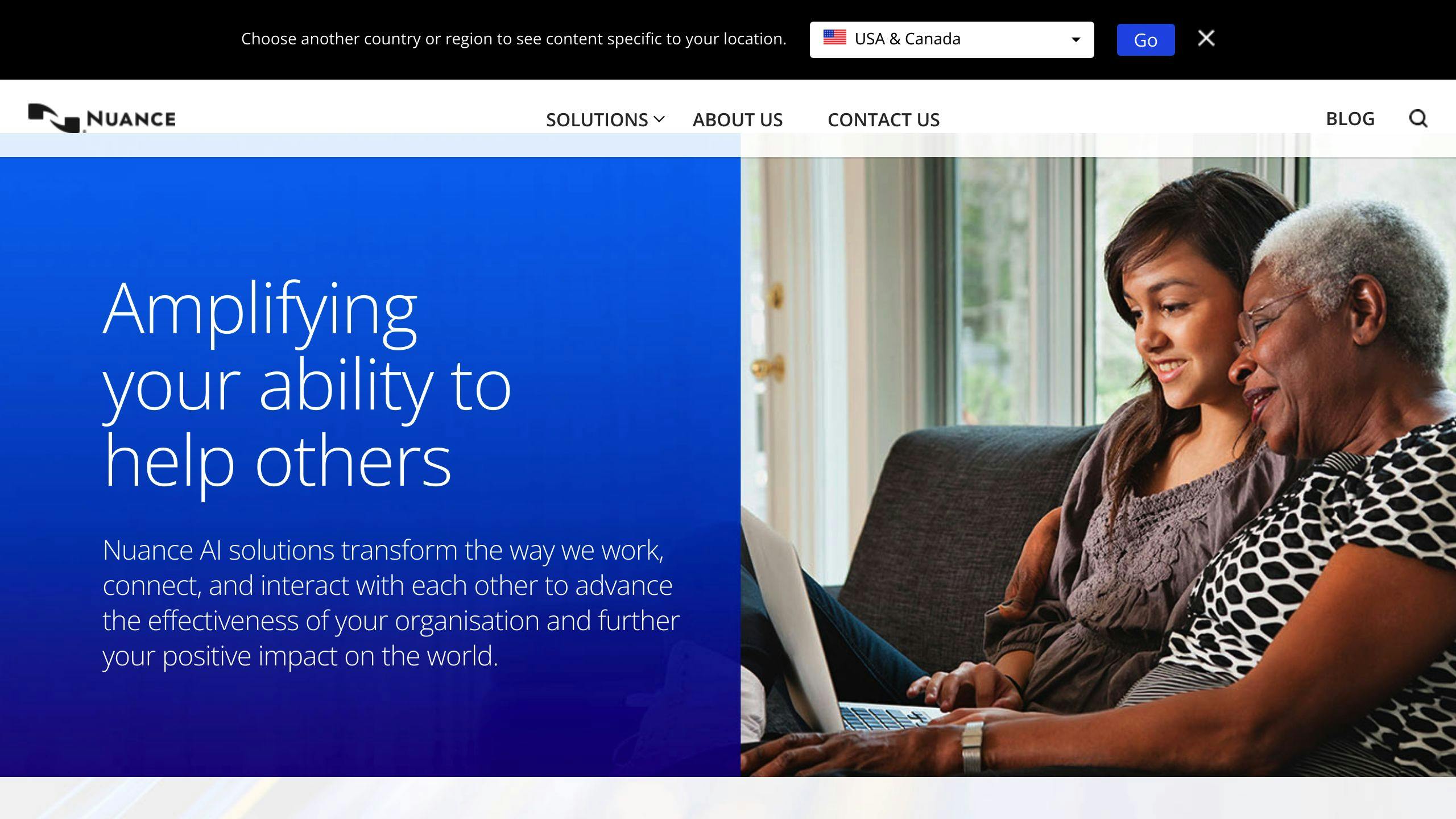
Accuracy and Reliability
Nuance is really good at writing down what doctors and patients say to each other, hitting the mark with more than 98% accuracy. It gets better as it learns, making fewer mistakes over time.
EHR Integration
Nuance works directly with big health record systems like Epic and Cerner, automatically putting visit notes where they need to go. This means doctors don't have to spend extra time typing or moving notes around.
Customization Options
Doctors can make Nuance fit their needs by creating their own templates and shortcuts for things they say a lot. They can also change how it looks to make it feel more personal.
User Interface and Ease of Use
Nuance has a simple and clear layout, making it easy to use. Everything important is on one screen, and it works on any device, so doctors can use it wherever they are.
Compliance and Security
Nuance uses strong security, like encryption, to keep patient information safe. It's regularly checked to make sure it stays secure and follows privacy rules.
Customer Support
Nuance offers help any time through phone, email, or chat. They also have online training and forums where users can share tips, helping everyone get better at using it.
5. ScribePT
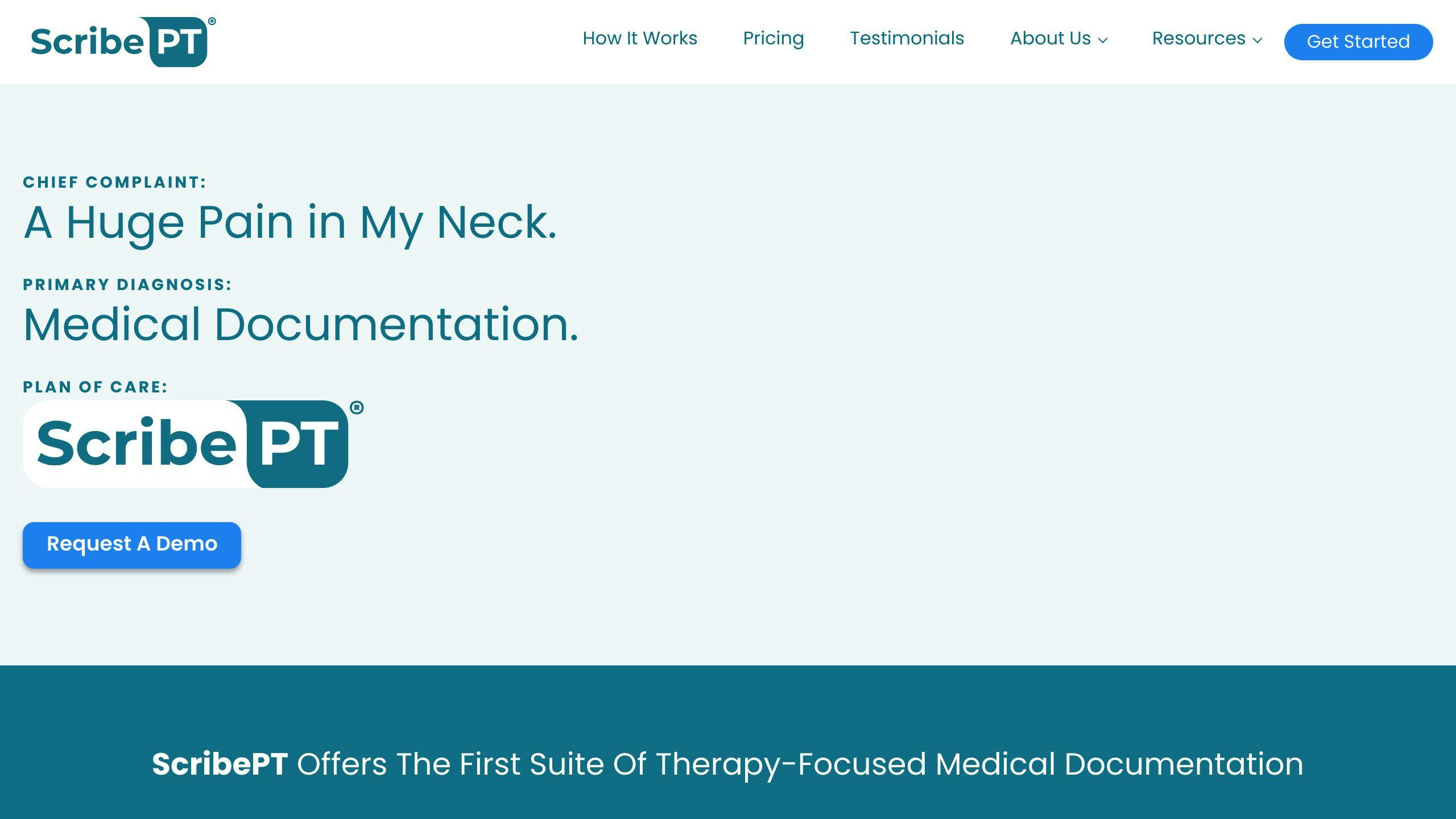
Accuracy and Reliability
ScribePT is really good at writing down what happens in doctor visits, getting it right over 98% of the time. It gets even better as it goes because it learns from any mistakes it makes.
EHR Integration
ScribePT makes it super easy to add notes to big health record systems like Epic and Cerner. With just a click, everything doctors need to document goes right where it should.
Customization Options
ScribePT lets doctors set it up the way they like. They can make their own templates and shortcuts, making their work faster and fitting their style.
User Interface and Ease of Use
The ScribePT setup is straightforward, putting everything doctors need in one spot. They can use it on any device, so they can work from anywhere.
Compliance and Security
ScribePT keeps patient information safe using strong security measures like encryption. It also follows HIPAA rules.
Customer Support
ScribePT is there to help anytime with support available through phone, email, and chat. They also offer guides, forums, and online training to make things easier for users.
6. Suki
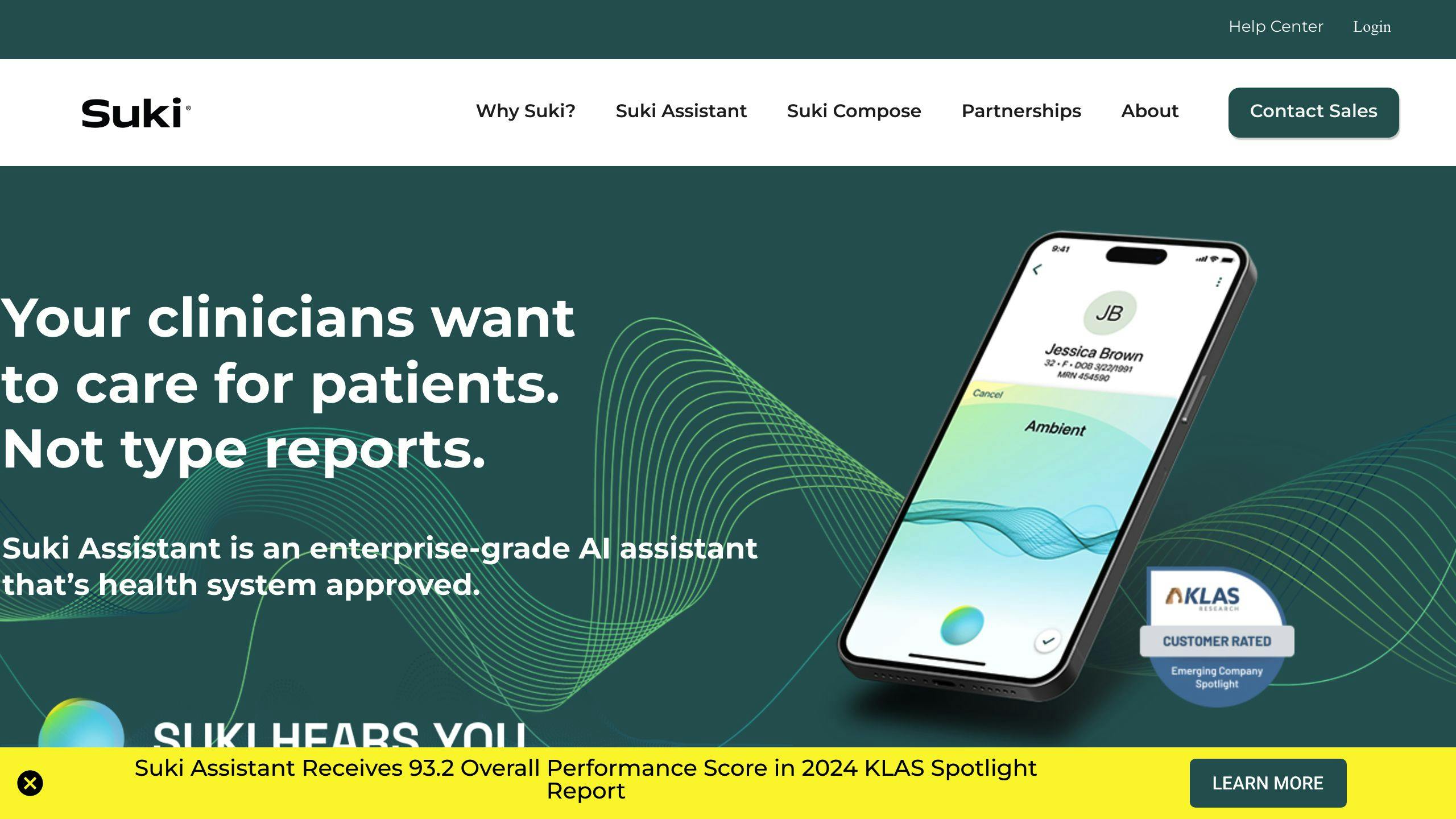
Accuracy and Reliability
Suki is really good at writing down what doctors and patients talk about. It understands medical words and how they're used in context, getting it right more than 98% of the time. The more you use Suki, the better it gets because it learns from every conversation.
EHR Integration
Suki works well with big systems doctors use to keep track of patient info, like Epic and Cerner. It automatically fills in patient charts with the right notes, making sure everything is accurate and saves time.
Customization Options
You can make Suki fit your needs. You can change templates, make shortcuts for words you use a lot, and even change how it looks. This makes it easier to use without having to change how you work.
User Interface and Ease of Use
Suki is easy to start using because it's designed to be simple. You can talk to it to give commands, letting doctors keep their focus on patients, not screens. It works on different devices, so you can use it anywhere.
Compliance and Security
Suki keeps patient info safe using strong security measures like encryption. It also makes sure only the right people can access the info and can get it back if something goes wrong. It checks regularly to make sure it's keeping info safe and private.
Customer Support
Suki offers help all the time, through phone, email, or chat. They also have online training and forums where you can learn more and get updates to make it even better to use.
7. Augmedix

Accuracy and Reliability
Augmedix is really good at understanding and writing down what doctors and patients say to each other. It's right about what's said more than 98% of the time because it knows a lot about medical words and their meanings. The more you use it, the smarter it gets, making fewer mistakes as it learns.
EHR Integration
Augmedix can easily send notes directly to big health record systems like Epic and Cerner. This means doctors don't have to waste time typing up notes themselves.
Customization Options
Doctors can make Augmedix fit their needs. They can set up shortcuts for words they use a lot and change settings to match how they work. It's made to work well for different kinds of doctors.
User Interface and Ease of Use
Augmedix has a simple main screen that shows everything doctors need without making it complicated. It's also made to work well on phones, so doctors can use it wherever they are. You don't need much training to start using it.
Compliance and Security
Augmedix uses strong security like encryption to keep patient info safe. It follows strict rules and checks often to make sure everything is secure. It also has backups to prevent losing any information.
Customer Support
If you need help, you can call or email them any time. They also have an online place where you can learn more and talk to other users to get tips.
8. Tali AI
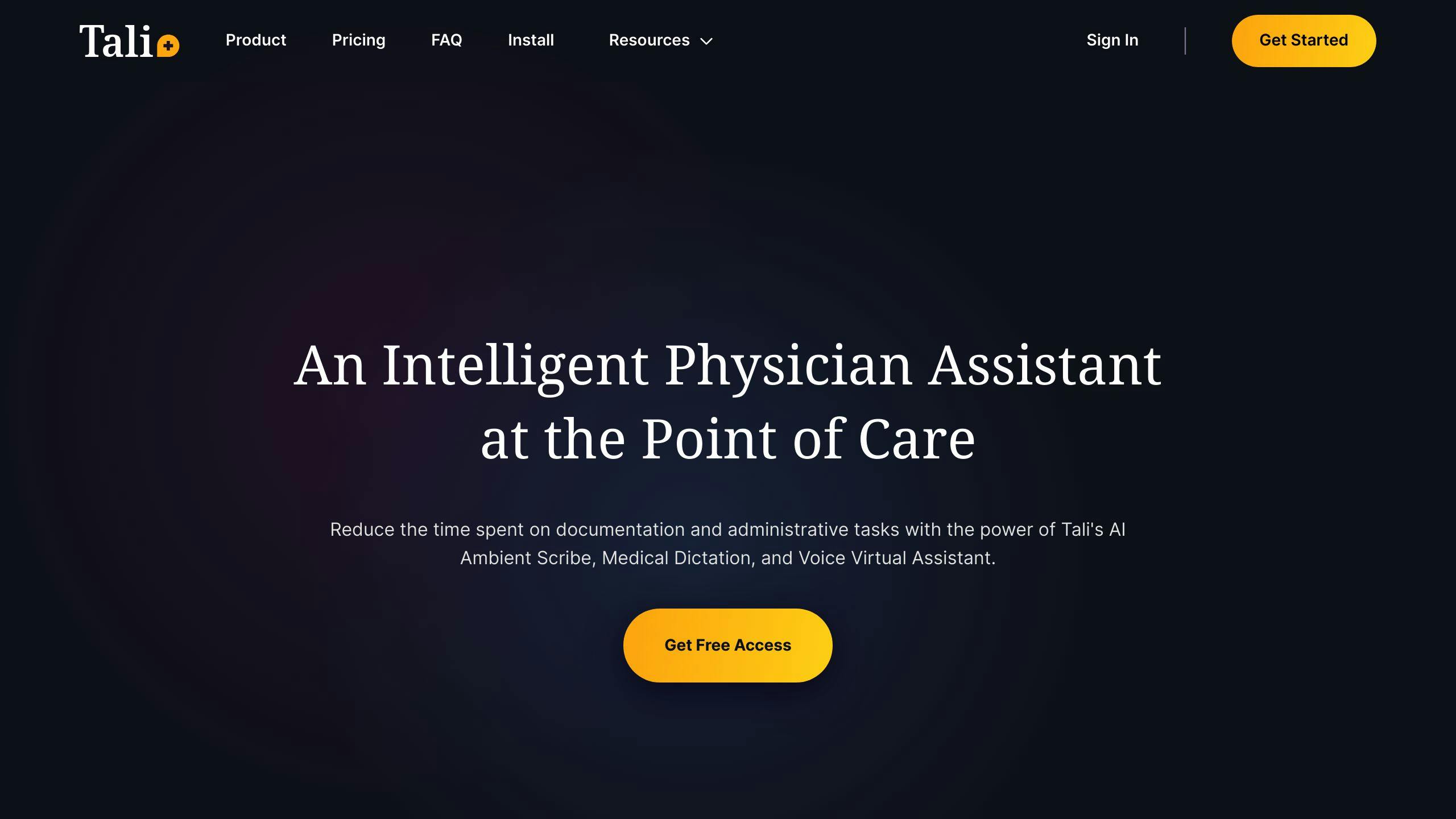
Accuracy and Reliability
Tali AI is really good at understanding and writing down what doctors and patients talk about, getting it right more than 98% of the time. It learns from every chat, getting even better as it goes.
EHR Integration
Tali AI works smoothly with computer systems doctors use for patient records, like Epic and Cerner. It sends notes straight to these systems, making doctors' work easier by skipping extra typing.
Customization Options
Tali AI lets doctors set it up just how they like. They can make their own templates, pick colors, and add their logo. It's all about making things fit their way of working.
User Interface and Ease of Use
Doctors can talk to Tali AI to make notes, letting them keep their hands free and focus on their patients. It's easy to use on any device, which is great for doctors who are always moving. Plus, it's simple to learn, even if you're not a tech expert.
Compliance and Security
Tali AI keeps patient info safe with strong security like encryption. It follows strict privacy laws and gets checked often to make sure everything's secure.
Customer Support
If you need help, Tali AI has a team ready 24/7 through phone, email, or chat. They also have online help like guides, forums, and training videos.
9. ScribeLink
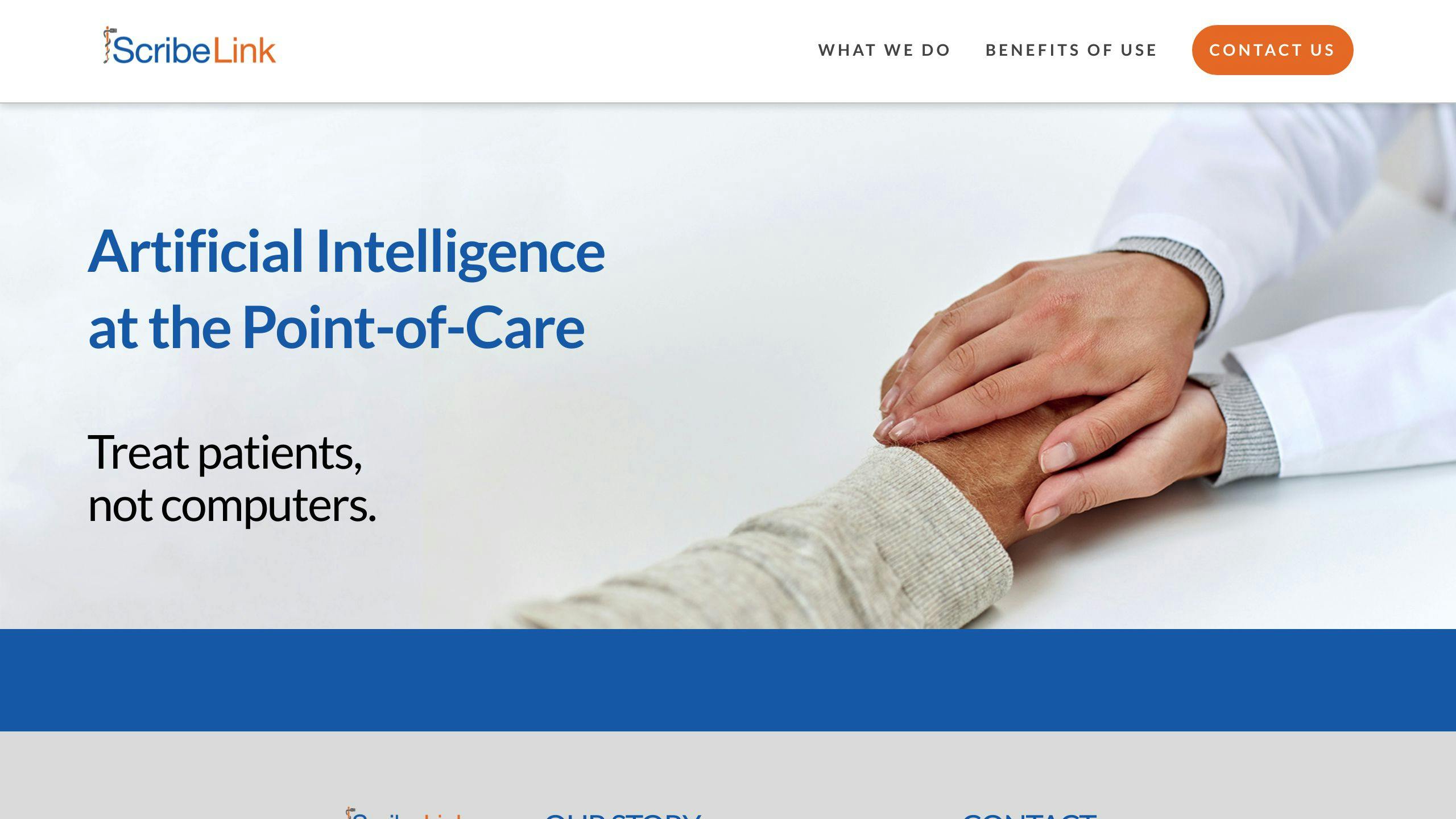
Accuracy and Reliability
ScribeLink writes down everything that happens during a doctor's visit as it's happening. This way, it captures all the details accurately, without missing a beat.
EHR Integration
ScribeLink works well with the computer systems doctors use to keep track of patient info. It writes notes directly into these systems as the doctor talks.
Customization Options
ScribeLink is all about writing down what's said during visits in real-time. It's designed to fit each doctor's specific needs, though it's not as flexible in customization as some other tools.
User Interface and Ease of Use
Doctors can talk to their patients without worrying about taking notes. There's no need for a computer screen during the chat, so they can focus more on the conversation.
Compliance and Security
ScribeLink is serious about keeping patient information safe. It follows strict rules and uses things like encryption to protect the data.
Customer Support
If doctors need help, they can get in touch by phone or email. The support team helps with starting up, tips on best practices, and fixing any issues with connecting or writing down notes.
10. Mutuo Health Solutions
Accuracy and Reliability
Mutuo Health Solutions is really good at understanding and writing down doctor-patient talks as they happen, getting it right over 98% of the time. It keeps getting better, learning from its experiences to make even fewer mistakes.
EHR Integration
Mutuo Health can talk directly with big health record systems like Epic and Cerner. This means it can put visit notes right where they belong without needing to copy or paste anything. It can even start up certain tasks in the health record system on its own.
Customization Options
Doctors can make it fit their needs by changing templates, making shortcuts for things they do often, and changing the look to suit them. There are also special templates made just for certain kinds of doctors to help them work faster.
User Interface and Ease of Use
Mutuo Health has a simple dashboard that shows a summary of patient visits and where the documentation stands. You can use it on different devices, which is handy. It's made to be easy for everyone to use, even if you're not used to tech stuff.
Compliance and Security
Mutuo Health uses strong security like encryption to keep patient info safe. It follows the rules to make sure everything is protected and checks often to make sure it stays that way. It also has backups in case anything goes wrong.
Customer Support
If you need help, you can reach out any time through phone, email, or chat. There are also online places to learn more, talk with other users, and find training to help you get the most out of the system.
Pros and Cons
Let's look at the good and not-so-good points of the top 10 AI medical scribes:
| AI Medical Scribe | Good Points | Not-So-Good Points |
|---|---|---|
| DeepCura | - Very accurate - Works well with EHR systems - You can change templates - Easy to use |
- Might be too pricey for small clinics |
| Freed | - Really good at taking down what's said - Connects without hassle to EHRs - Can be adjusted to fit your needs - Straightforward to use |
- Not many options for getting help |
| DeepScribe | - Notes are super accurate - Fits right into big EHR systems - Can be set up how you like it - Easy dashboard |
- Setting it up might need some tech know-how |
| Nuance | - Documents with over 98% accuracy - Syncs directly with EHRs - Lets you personalize it - Clean and simple interface |
- Cost might be high for some |
| ScribePT | - Very good at writing down talks - Easy document adding to EHRs - Allows some changes to templates - Simple to navigate |
- Not as many ways to customize |
| Suki | - Gets medical terms right - Puts info into EHRs by itself - Can change settings as needed - Use it without needing your hands |
- Could use better encryption |
| Augmedix | - Reliable at taking notes - Connects easily with EHRs - Lets you make shortcuts - Friendly for phone use |
- Not many help options available |
| Tali AI | - Notes are accurate over 98% of the time - Joins up with big EHR systems well - Lots of ways to make it yours - You can talk to it for notes |
- Could be better at following privacy rules |
| ScribeLink | - Writes down talks as they happen - Puts notes right into EHR systems - Can be adjusted to each doctor |
- Less freedom to make it your own - Some parts could be more secure |
| Mutuo Health Solutions | - Good at understanding medical chat - Talks both ways with EHR systems - Many ways to make it fit your style - Shows a summary on its dashboard |
- Could give more control over who sees what |
Advancements in AI Medical Scribes
AI medical scribes are getting better and better, thanks to new steps forward in how computers understand and process human language and learn from data. These improvements mean they're getting really good at writing down what doctors and patients say, working smoothly with electronic health records, and being easy for doctors to use.
Improvements in Accuracy
One big win has been making these AI scribes more accurate. The newest computer models are getting really good at understanding medical terms and the details of conversations between doctors and patients. Now, the best of these tools can write down what's said with more than 98% accuracy.
They also learn from any mistakes and get to know how each doctor speaks and uses medical words. Over time, this means the AI scribe gets even better at writing things down just right for each doctor.
Enhanced Integration Capabilities
Another important improvement is how well these AI scribes can now talk to the electronic health records systems that doctors use, like Epic and Cerner. They use modern tech to send what they've written directly into these records, so doctors don't have to.
This means no more double work for doctors, saving them a lot of time. Some AI scribes can even pull information from the records to make sure what they write down is complete and correct.
Improved User Experience
The latest AI scribes are also designed to be really easy for doctors to use. They can understand natural conversation, so doctors just talk as they normally would. The AI works in the background, so doctors don't have to deal with complicated tech.
Some AI scribes let doctors make changes in real-time, which makes fixing any mistakes quick and easy. They also let doctors change how they look and work to match what the doctor needs and likes. This helps doctors work the way they want, using the devices they prefer.
As AI gets even smarter, these medical scribes will keep getting better, always focusing on making things easier for doctors while keeping care at the heart of what they do.
sbb-itb-527d68c
Selection Guide for AI Medical Scribes
Choosing the best AI medical scribe for your healthcare team might seem tough because there are a lot of options out there. But if you think about what your team really needs, it can become much simpler. This guide will help you figure out the most important things to look for, so you can pick the best AI helper for your work.
Specialty-Specific Needs
What kind of medicine your team practices should be a big part of your decision:
- Primary care - Look for scribes that are good at handling all sorts of basic health talks. They should be great at noting down key health details and patient stories.
- Specialty care (like heart doctors, bone doctors) - You'll want a scribe that knows a lot about your specific area. It should offer special templates and know the right terms.
- Mental health - Pick a scribe that's ready for mental health sessions and works well with online visits. Keeping patient talks private is super important.
- Multi-specialty - If you have different kinds of doctors, find a scribe that's good with many areas or consider getting a few different ones.
Think about which scribe knows your area best.
Practice Setting Requirements
Your team size, how many patients you see, and where you give care should guide your choice too.
- Solo clinicians - If you're working by yourself, you might like a simple tool that's easy to start using.
- Small practices - Small teams should look for options that don't break the bank but still let everyone use the tool together.
- Large health systems - Big teams need a scribe that can handle a lot of users, has strong security, and connects well with patient record systems.
- Remote/telehealth - If you see patients online, make sure the scribe can handle online visits, keep data safe, and work in real-time.
Think about how easy it will be for your team to start using the new tool.
Budget Limitations
How much you can spend will also affect your choice. Luckily, there are different plans to fit every budget.
- Individual clinicians - If it's just you, there are basic plans that are more affordable. They might not have all the fancy features, though.
- Small clinics - Mid-range plans let a small clinic use the tool together, with some extra features included.
- Hospital systems - Big hospitals will need the full package, which costs more but does everything they need.
- Budget focused - Some companies offer free versions so you can try before you buy. These have fewer features but can still be very useful.
Look at how the pricing works and what you get for your money.
Key Takeaways
- Think about what kind of medicine you practice, your team size, and your budget.
- Check what each scribe offers and see if it matches what you need.
- Try them out with free trials to see how they work for you.
- Focus on what you really need for documenting patient talks, not just the extra stuff.
- Make sure the scribe can connect to your patient records system, keeps data safe, and has good support.
Finding the right AI scribe means matching it to what your team does every day. This guide can help you figure out which one will make your work easier and better!
Challenges and Considerations
When we start using AI medical scribes, it's not all smooth sailing. There are some bumps along the way that we need to think about. Here's a rundown of the main issues:
Integration Complexity
-
Mixing AI scribes with the systems doctors already use to keep track of patient info can be tricky. Sometimes, you might need extra help from tech experts.
-
Doctors might have to change how they work to make room for the AI's automatic note-taking. This could be a big adjustment for some.
-
The tech that lets different systems talk to each other is still getting better. Not everything works together perfectly yet, which can make some things harder to do.
Training Requirements
-
Doctors and their teams will need to learn how to use these new AI tools. If they don't get the hang of it, they might not use it much.
-
Even though the AI is doing a lot of the writing, doctors still need to make sure important stuff is noted down right.
-
The people in charge might have to come up with new rules on how to use these AI scribes so everything stays organized.
Privacy and Security Concerns
-
Keeping patient info safe is super important when you bring AI into the picture. We have to be really careful.
-
Following privacy laws, controlling who can see what, and keeping the data safe are all things that need extra attention.
-
As threats to data security keep changing, it's important to keep checking that patient info is protected.
By thinking about these issues ahead of time and planning for them, using AI scribes can go a lot smoother. It's all about making sure we get the benefits without causing new problems.
Conclusion
AI medical scribes are really helpful for making doctors' jobs easier and making sure patients get good care. As the technology behind understanding and learning from human speech gets better, these AI helpers will become even smarter and more helpful.
But, when you're thinking about getting an AI scribe, it's important to look at a few things. You need to make sure it writes things down correctly, works well with the computer systems doctors use, can be adjusted to fit your needs, is easy to use, keeps patient information safe, and comes with good support. It's also key to try them out and teach your staff how to use them properly.
In the end, AI medical scribes have a lot of potential to make paperwork easier for doctors and make records more accurate - giving doctors more time to focus on taking care of their patients. By choosing the right AI scribe based on what you need and where you work, bringing one into your healthcare team can really help your patients, doctors, and the whole healthcare group.

